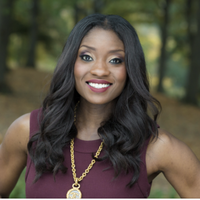The State of Gabrielle Union
“They say silence is violence, and I refuse to be complicit in my silence.”
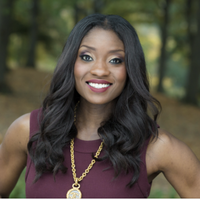
Select the newsletters you’d like to receive. Then, add your email to sign up.
You are now subscribed
Your newsletter sign-up was successful
Want to add more newsletters?

Delivered daily
Marie Claire Daily
Get exclusive access to fashion and beauty trends, hot-off-the-press celebrity news, and more.

Sent weekly on Saturday
Marie Claire Self Checkout
Exclusive access to expert shopping and styling advice from Nikki Ogunnaike, Marie Claire's editor-in-chief.

Once a week
Maire Claire Face Forward
Insider tips and recommendations for skin, hair, makeup, nails and more from Hannah Baxter, Marie Claire's beauty director.

Once a week
Livingetc
Your shortcut to the now and the next in contemporary home decoration, from designing a fashion-forward kitchen to decoding color schemes, and the latest interiors trends.

Delivered Daily
Homes & Gardens
The ultimate interior design resource from the world's leading experts - discover inspiring decorating ideas, color scheming know-how, garden inspiration and shopping expertise.
Deep in the heart of Los Angeles’s San Fernando Valley on a sun-drenched Sunday morning, you’ll find Gabrielle Union bathed in beatific light. In a scene worthy of a Slim Aarons photo, she’s perched near an infinity pool, sporting a bathing suit that casually highlights her taut abs and immediately reminds you that gravity hasn’t taken a single toll on this woman. If the word carefree had a face, in this very moment, it would be Union’s—but looks can be deceiving, of course. Like many of us, she’s spent most of this year homebound with her loved ones, a first for the actress, who is married to ballplayer turned businessman Dwyane Wade. “I’ve never really been trapped as an adult in one location,” admits Union—who has spent her more-than-two-decade career shuttling to and from sets—when we connect over Zoom in July. “There is no job to run off to. There is no deferring of dealing with anything. But I’ve found real joy in my family,” she says, beaming, “and I’ve found a lot of peace.”
As Union reclines in her lounge chair and makes small talk about spotty Wi-Fi reception, I’m almost able to forget that we’re still in the midst of the global COVID-19 pandemic, that Union, until very recently, was locked in a contentious battle with NBC over her unceremonious dismissal as a judge on America’s Got Talent, and that our country is engulfed in a racial reckoning spurred by the formidable Black Lives Matter movement and the killings of George Floyd, Breonna Taylor, Ahmaud Arbery, and hundreds more. The California wildfires, the tornadoes in the South, the tragic losses of Black Panther star Chadwick Boseman and Supreme Court Justice Ruth Bader Ginsburg—these horrific truths are never far from Union’s mind. “Anxiety on top of anxiety on top of anxiety” is how she describes what it feels like on her toughest days.
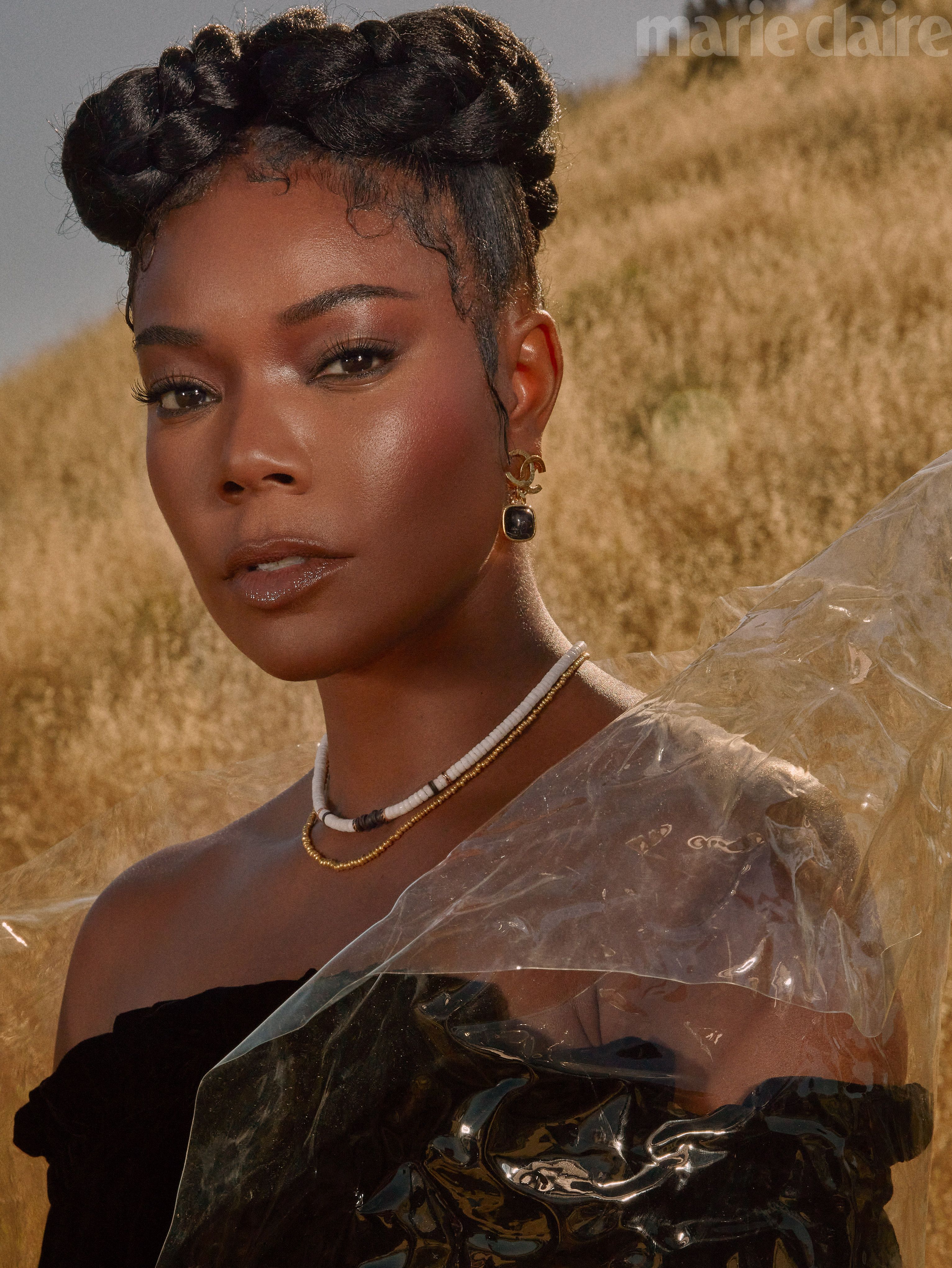
Chanel dress and earrings; Sara Beltran white necklace; Loren Nicole gold necklace.
Uncertainty appears to be the only certainty in 2020, and yet nothing has slowed down Union, an indefatigable one-woman cottage industry with ambition and moxie to burn. She began her career as a model in the late ’90s, segued into films quickly thereafter, and has worked steadily ever since, appearing in classic teen comedies (10 Things I Hate About You and Bring It On), action flicks (Bad Boys II, Breaking In), rom-coms (Deliver Us From Eva, Think Like a Man), and dramas (Cadillac Records, The Birth of a Nation, Being Mary Jane). Off camera, the 47-year-old has taken on even more roles: supportive basketball wife, mother, author, television and film producer, activist, entrepreneur. She’s created 23 collections for her New York & Company clothing line. She and costar Jessica Alba recently secured a second season of their hit cop series, L.A.’s Finest, which they have executive-producer titles on. The Perfect Find, a romantic comedy that she’ll also produce and star in, landed at Netflix. Her memoir, We’re Going to Need More Wine, made the New York Times best-seller list, and she scored yet another literary hit with her first children’s book, Welcome to the Party. She’s also a major investor in Bitsy’s, a line of organic snack food that aims to make healthy food available to the masses. “My wife is a boss,” says Wade, who has thoroughly enjoyed watching Union’s grind up close during lockdown. “She does so much. I don’t even know how she has enough hours in the day, and she still gives me the attention and love that I need and deserve. I can never not give her praises because she’s incredible.” As if she weren’t juggling enough, this summer she relaunched her hair-care line, Flawless by Gabrielle Union, after a three-year hiatus. The products are made with natural ingredients and have a budget-friendly price tag. (Nothing in the line costs more than $10.) “We wanted to make sure that no matter what your socio-economic status is, you’re able to buy these products,” says celebrity hairstylist Larry Sims, Union’s dear friend and partner in the endeavor. “It wasn’t about creating these huge margins and how much money we could make.”
Sims and Union have been playing with the Flawless blowout cream today, and judging from the way she’s stroking her freshly washed tresses, she’s clearly happy with the results. “It’s been a journey,” says Union, who has spoken openly about losing her hair following IVF. It’s all too fitting that we’re chatting about the state of her hair, given that the policing of it was one of the many “microaggressions” Union claims she endured while at AGT.
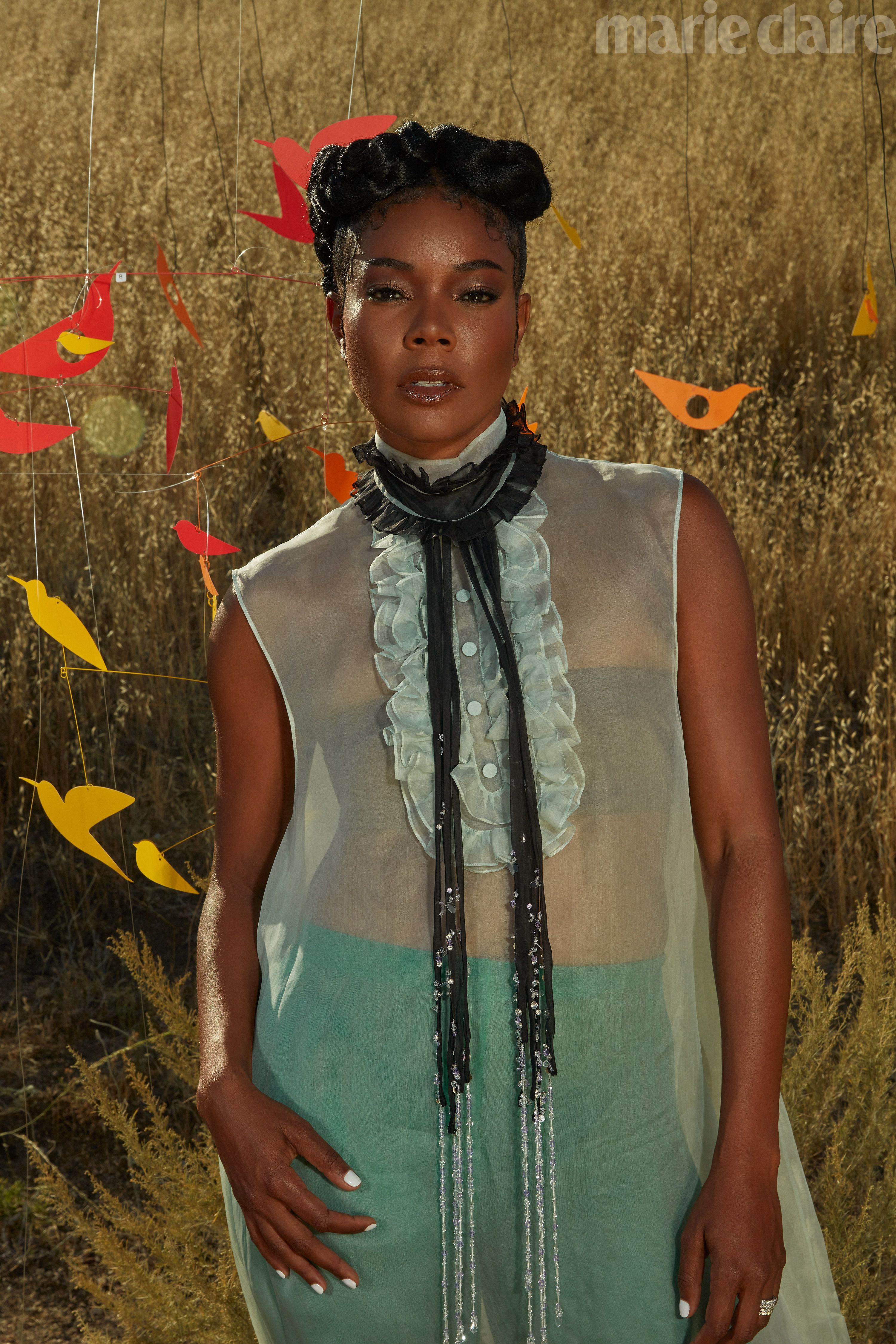
Prada dress, top, and tights.
She signed on to the series last year thinking it would be fun. It wasn’t. The show’s producers gave her “excessive notes” about her appearance, she says, and allegedly called her hairstyles “too wild,” which Union believes was code for “too Black.” She maintains that her ability to rock an assortment of looks should’ve been viewed as a bonus and not a liability. “That is the beauty of being a Black woman,” she declares. “I should be able to exist however the f*** I want to exist, because if you’re hiring Gabrielle Union for my talent, then my talent is going to come out of my body in every way, shape, and incarnation that I can imagine. You’re getting more bang for your buck the more you allow me to exist as I see fit.”
From her first day on set of the competition series, Union knew she was in trouble. She was forced to contend with Simon Cowell’s unchecked penchant for smoking indoors (Union is severely allergic to cigarette smoke), racism on set (like guest judge Jay Leno making racist jokes about people of Korean descent eating dogs), and a glaring lack of diversity at AGT, which is produced by Fremantle and Cowell’s Syco Entertainment. Because Cowell has built an entire television career on his image as an irascible provocateur, I ask Union if she thinks he is a genuine racist or just an equal-opportunity asshole. She pauses to collect her thoughts. It’s the only time in our nearly two-hour conversation that she treads carefully. “I am one who calls people who continuously exhibit racist behavior racist,” she offers, “but for the super sensitive, I will say he has exhibited wildly problematic behavior.”
In her complaint filed with the California Department of Fair Employment and Housing in June, NBC is described as a “snake pit of racial offenses.” After an investigation into his workplace misconduct, NBC Entertainment chairman Paul Telegdy, who was accused of racism, homophobia, and misogyny by current and former employees, abruptly departed in late summer. Last week, Union and NBC released a joint statement announcing that they’d reached an “amicable resolution” (one that reportedly included a substantial payout for Union). “NBC Entertainment appreciates the important concerns raised by Gabrielle Union and remains committed to ensuring an inclusive and supportive working environment where people of all backgrounds are treated with respect.” Cowell’s team did not respond to a request for comment as of press time.
Get exclusive access to fashion and beauty trends, hot-off-the-press celebrity news, and more.
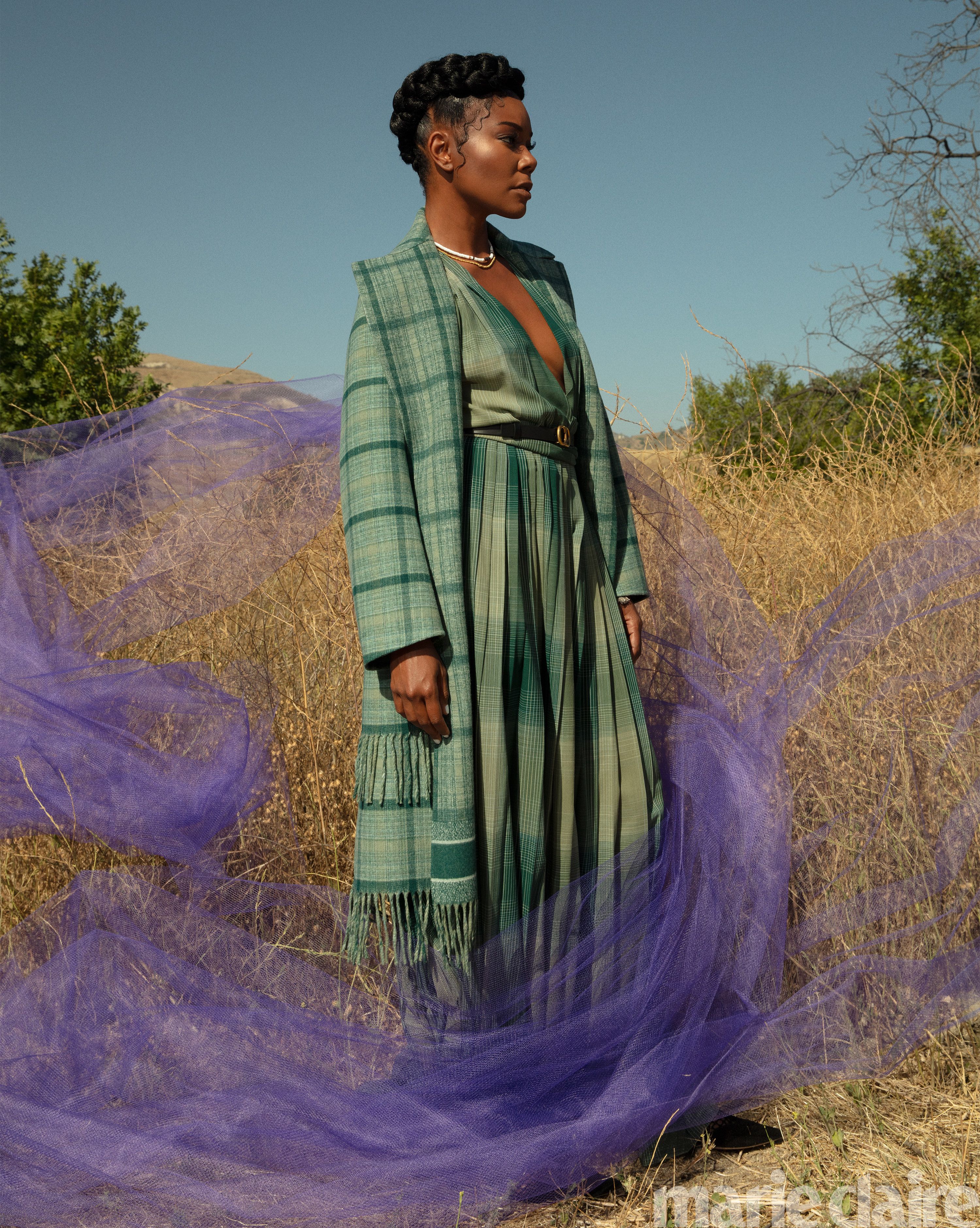
Dior wrap coat and dress; Sara Beltran white necklace; Loren Nicole gold necklace.
Union admits that she was initially disappointed that high-profile Black NBC talent like Al Roker and Terry Crews didn’t publicly support her, though she’s not at all surprised. “These racist institutions and systems have done an amazing job at keeping us very fearful of speaking up, asking for equality, and asking for accountability, because they have shown us time and time again that we are disposable,” she says. “They will discredit and malign you, and you will never work again.…Being blackballed in this industry is very real.” She’s also well aware that coming from a place of extreme privilege makes it easier to speak up and be a whistleblower. In addition to her ancillary revenue streams, Union and her husband are, to put it mildly, comfortable. According to Variety magazine, the couple spent more than $17 million on their 22,000-square-foot spread in L.A. They own yet another multimillion-dollar megamansion in Miami. But what’s the point of having wealth if you’re too cowed to advocate for what’s right? “How much do you need to have in the bank before you feel comfortable speaking truth to power?” Union wonders. “What’s the magic number?” And having a sizable safety net doesn’t make the fight any less daunting. “She loses a lot of sleep at times; she stresses out because she wants to do right by everyone,” Wade says of his wife of six years. He’s got her back through it all. “She knows that she’s not going to fall,” he says. “I’m going to catch her. I’m right there.”
To skeptics who’ve suggested that Union’s case is less about rampant racism at NBC and more about retribution for being fired from AGT, that the indignities she endured weren’t all that bad and that she made waves to generate publicity, she says, “That very sentiment is how all of this has been allowed to go on for centuries; that kind of gaslighting, I categorically reject. You are not going to gaslight me into minimizing my trauma, which is exactly what allows this to continue on for the next person.” She credits age with her newfound outspokenness. In the past, she’d often make herself as “small and palatable as possible” for fear of being labeled difficult or—even worse—angry, which only made her, well, angry. She has referred to the rage she once harbored as a “festering stew of poison and venom in my belly.” Years of weekly therapy has helped a great deal. Turning 40 was also liberating. After hitting that magic number, “I emptied out my basket of f***s,” she reveals. “I cannot center fear in my life. I can’t center functioning from a fear of scarcity. They say silence is violence, and I refuse to be complicit in my silence. I have to be fully present in my body and fully free.”
Union isn’t the only one emptying out that basket. In recent months, Thandie Newton, Michaela Coel, Viola Davis, Nia Long, and more have come forward with their own Hollywood horror stories. I ask Union about this unprecedented level of transparency and why Black actresses are finally—finally!—openly discussing everything from sexual harassment and virulent industry discrimination to gross pay inequity and the policing of their bodies. “We want to be free, and we want to try and protect as many people as possible,” she explains. “They want you to feel like ‘It’s not me, it’s you, you’re crazy, you’re doing something that’s causing this, you are complicit in your own oppression, your own trauma, your own abuse.’ And as long as you’re in that space, you’re not going to talk about it. You’re not going to reach out to anybody.” Their collective honesty, she hopes, will function as a “life raft” for others. “The more you are transparent and the more you speak truth to power, it creates more space for other people to claim their reality, to claim their pain, to claim their healing, and, if you want, to claim your justice.”
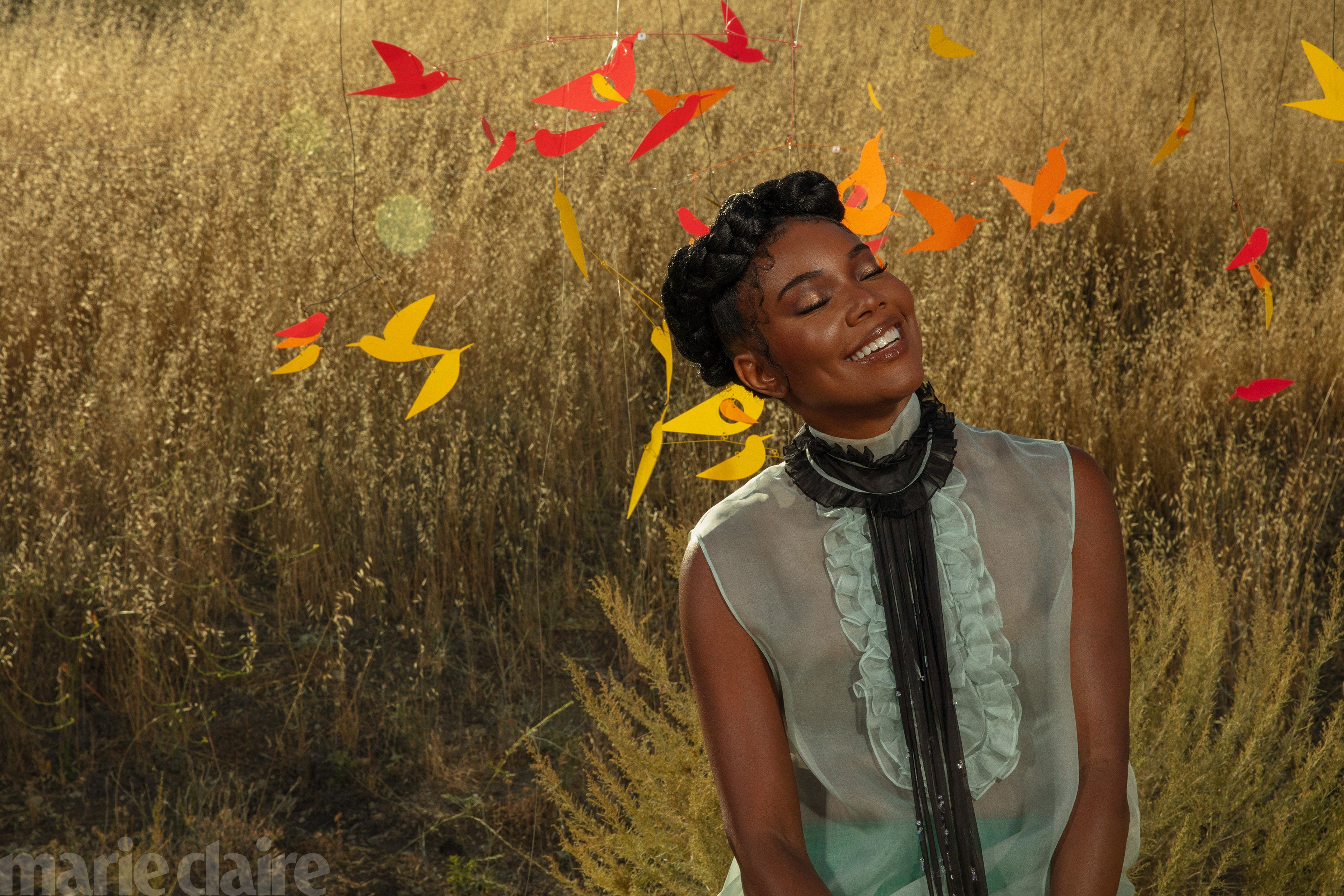
Prada dress, top, and tights.
After the untimely death of basketball great Kobe Bryant and the disintegration of her relationship with NBC, Union couldn’t fathom that this year could get any worse. “And then 2020 was like, ‘Hold my purse,’” she deadpans. As Union quickly ticks off the list of devastating news stories and bizarre plot twists we’ve all endured, she grows weary. “Oh, by the way, there are aliens. Yes, extraterrestrials are real. Oh, by the way, get a load of these murder hornets. And oh, by the way, we’re going to be fed a daily barrage of the murders of Black people. Oh, by the way, literally half of our country is going to categorically reject all of the measures that we can take to save ourselves and our neighbors.” Losing the trailblazing, collar-loving Notorious RBG was “catastrophic and gut wrenching,” Union shares in a follow-up email in September. “For a lot of us, it extinguished the bit of hope that we had left, and for some of us it ignited an inferno within us that made us want to step into the gap that she left.” News that the Kentucky police officers responsible for Breonna Taylor’s death escaped charges didn’t shock her—“We know that the criminal-justice system is not built for Black people; it’s not built to benefit any marginalized person”—but it has fueled her fight and, she believes, should motivate us all “to not shut up and to not just put our heads down and go along to get along, to continue to be loud and a force that they have to reckon with.”
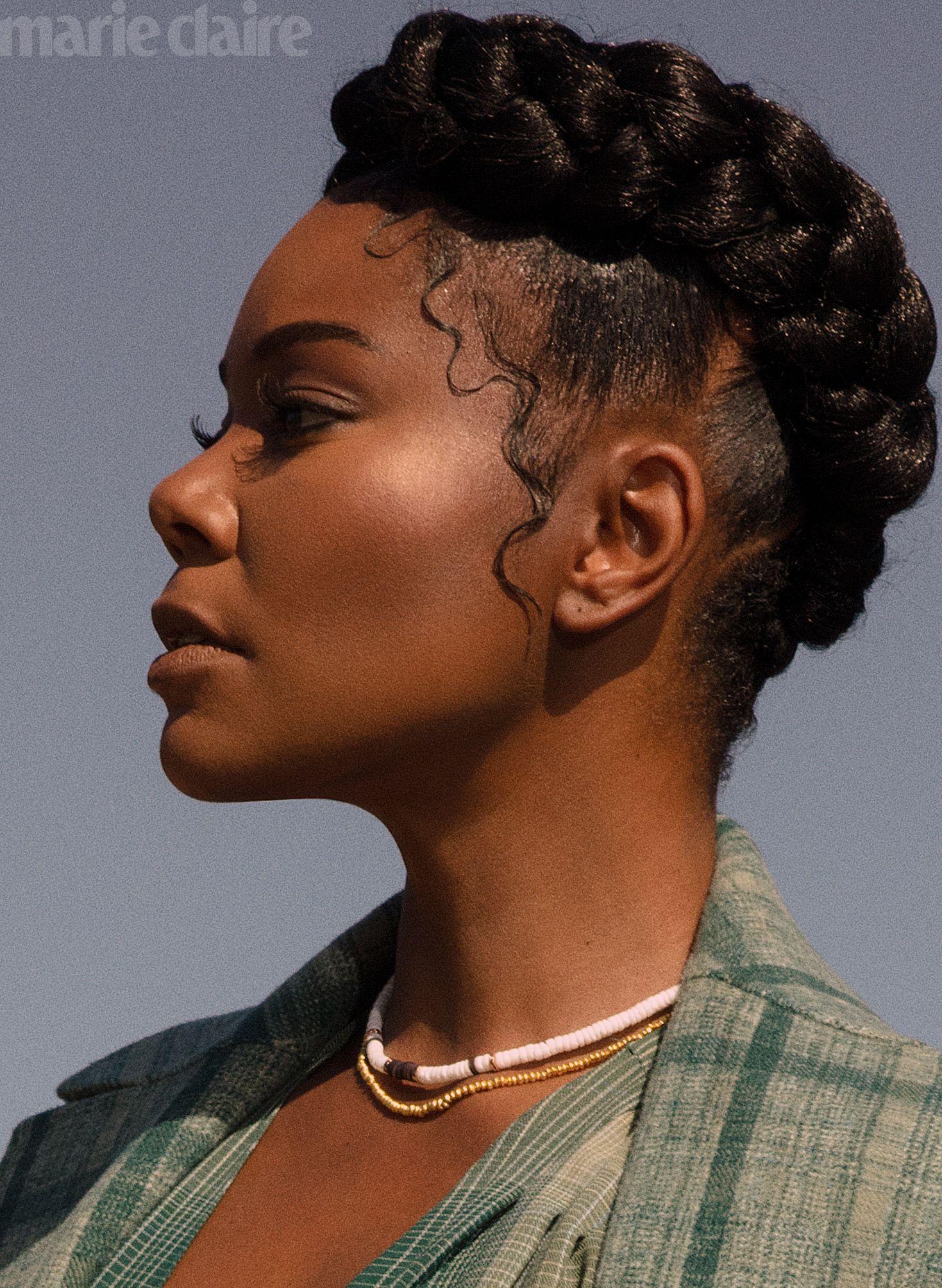
Dior wrap coat and dress; Sara Beltran white necklace; Loren Nicole gold necklace.
All of the fighting does take its toll, and some days Union oscillates between numbness and being overwhelmed by “terror bursts” that can erupt at a moment’s notice. “I haven’t been in this particular space probably since shortly after I was raped at 19,” she reveals. “Terror just feels very present in my body, more than it has been in more than 25 years.”
NBC isn’t the first company Union has sued for workplace malfeasance. During her Being Mary Jane run, she filed a breach-of-contract suit against BET/Viacom, which was later settled. And at only 19, she took on the Payless corporation after she was sexually assaulted at gunpoint during her evening shift at a California branch. The same day of her assault, the company sent out a notice about the price change for a shoe but failed to mention that a serial rapist had been targeting Payless stores in the area. Upon learning that news, Union was heartbroken and livid: “My whole life didn’t have to be destroyed because they cared more about a shoe than people, so I sued them.” The suit was settled, but she was never asked to sign a nondisclosure agreement, and as a result, she has spoken openly about her rape for decades. “They didn’t care enough about me to silence me, because they never thought that the little Black girl that mattered less to them than a shoe would ever be in a position to be dragging them for filth.”
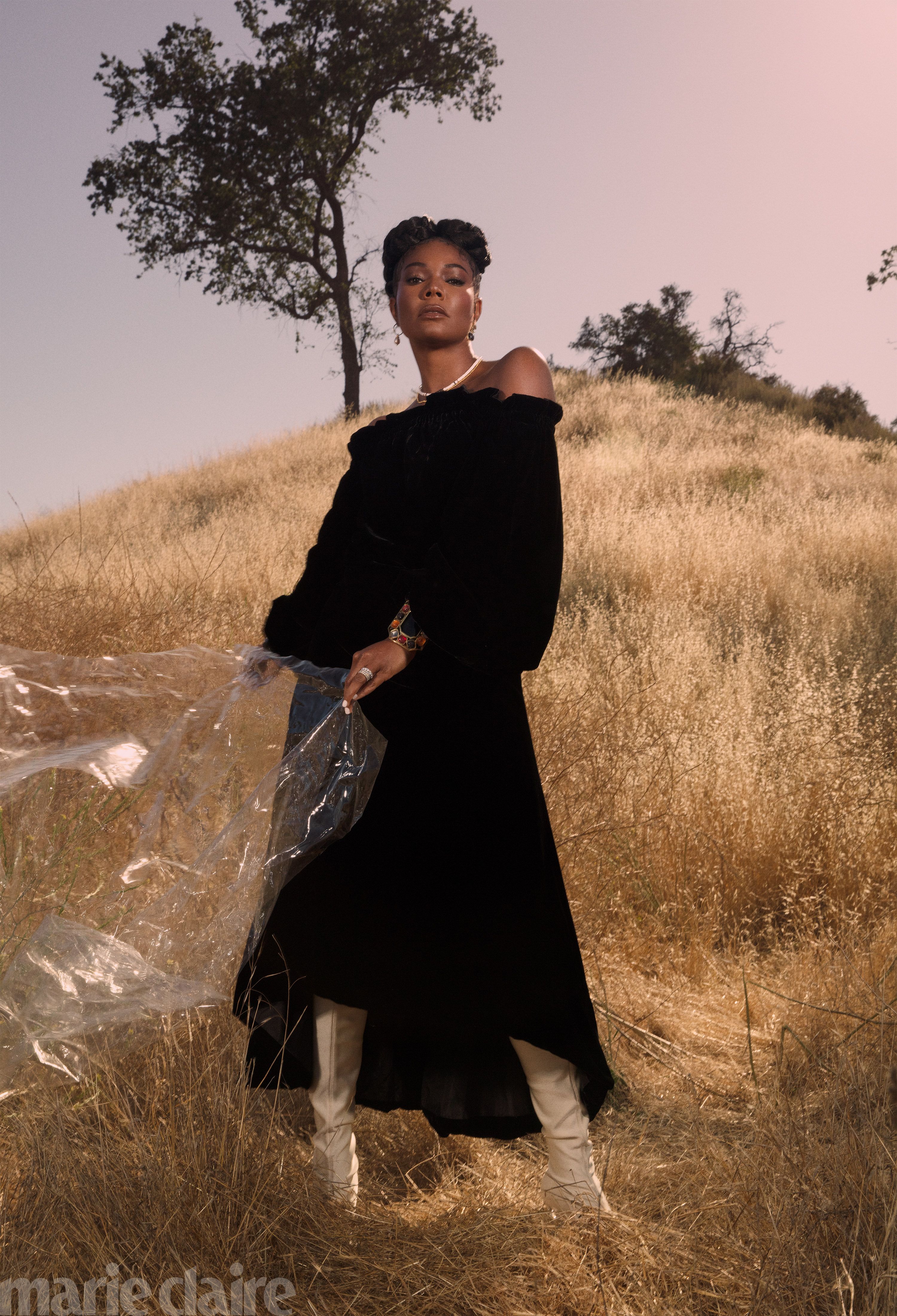
Chanel dress, cuff bracelet, and earring; Prounis pearl earring; Brother Vellies boots; Sara Beltran white necklace; Loren Nicole gold necklace.
These days, she’s hard at work on the follow-up to her memoir. She calls the act of writing “very freeing,” but releasing those words into the world is still absolutely terrifying, she confesses. “I liken it to, you wait all this time to have a baby, you have the baby, and then you toss the baby into the crowd and you have to hope that the crowd catches your baby, it doesn’t drop the baby, drop-kick your baby, or talk s*** about your baby. It takes a lot of trust.” With this book, Union will take an even deeper dive into her career and her complicated motherhood journey, with multiple miscarriages (she lost count after eight), failed IVF treatments, and the birth via surrogate of her daughter, Kaavia James, in 2018. With her more than 1 million followers, Kaavia is now a bona fide Instagram darling and the adorable subject of countless shade-filled memes. She’s brought Union unimaginable happiness. “[Motherhood] looks good on her,” says Wade. “This kind of joy is different from anything that she has ever experienced.” Her stepdaughter, Zaya, who came out to the world as trans last year, has been living as her “authentic self since third grade,” Union shares, and inspiring countless others to do the same. In an effort to be the best possible allies to Zaya, Wade and Union reached out to health-care professionals, LGBTQ+ activists, and members of the Pose cast and quickly got up to speed on the right gender pronouns. Zaya’s comfort is of the utmost importance to the Wade family. “You want your child to feel freedom to be exactly as they are,” Union says, later adding that “we are her lifetime lifelines to love, peace, joy, grace, protection, and compassion.”
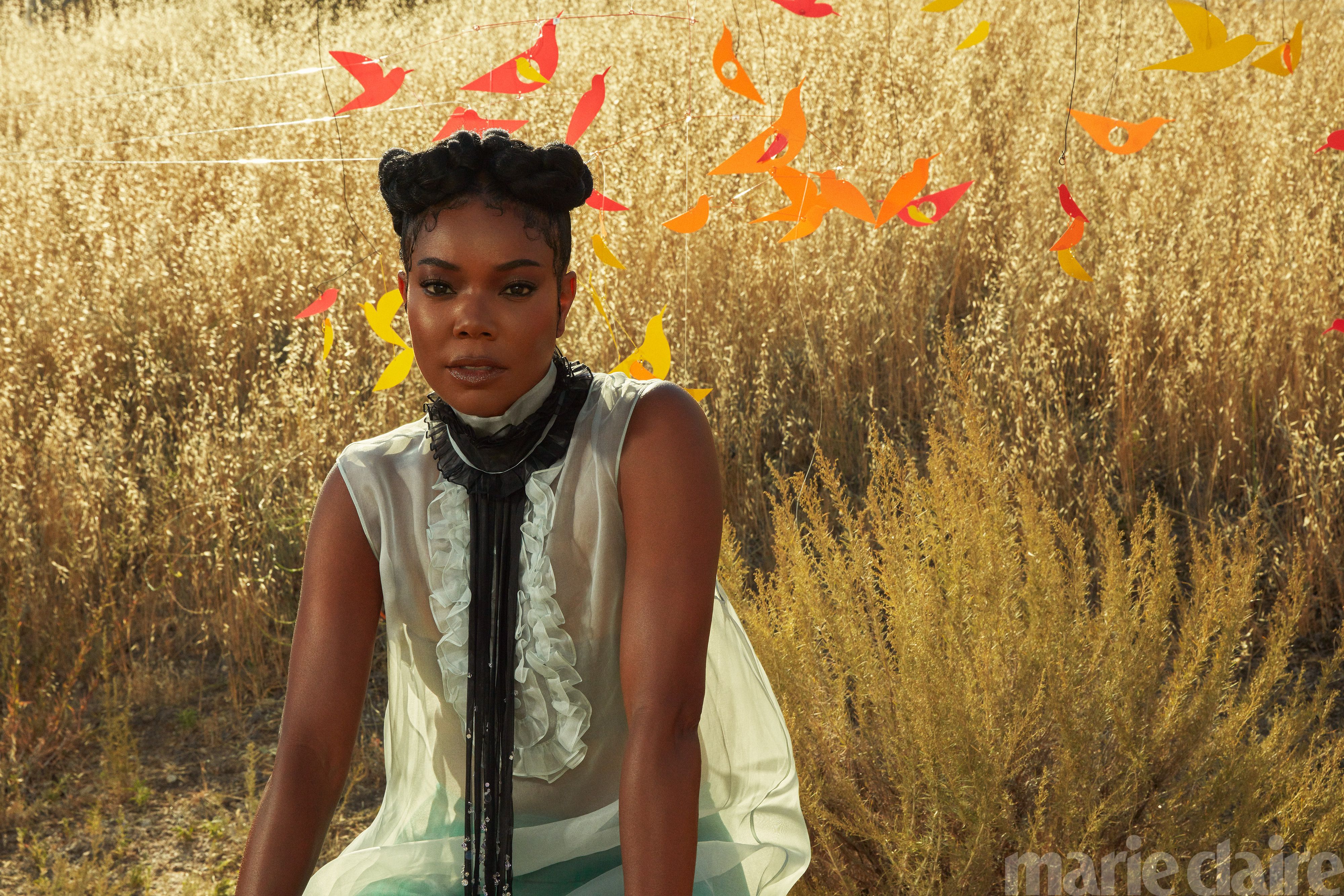
Union’s production company, I’ll Have Another, has a slate of projects in the pipeline, and she remains on the hunt for books and scripts by people of color. The mission of her company is simple: center marginalized people in their own stories, empower them, and pay them. (“I don’t need all the checks. I can’t be in everything.”) “They can bring on [other talented marginalized people],” she says. “It’s like a pyramid scheme, but with talent.”
While it has a long way to go regarding race, the entertainment industry seems to have at least grown more comfortable with casting women over the ripe old age of 45. Legends like Dame Judi Dench and Cicely Tyson continue to perform well into their 80s and 90s, and Union is looking forward to many more years on sets once the world safely opens up again. “There will be a lifetime of stories to tell, and I’d like to think that as I age, they’ll age up,” Union says. “I’m open to anything, provided that it lends itself to my joy, my peace, and my grace.”
Photographer: Djeneba Aduayom | Fashion Editor: Thomas Kikis at the Wall Group | Hair: Larry Sims at Forward Artists for Flawless | Makeup: Sir John at Management + Artists for L’Oréal | Manicure: Thuy Nguyen using OPI at A-Frame Agency | Set Design: Wooden Ladder
This story has been updated.
MORE FROM OUR OCTOBER DIGITAL ISSUE
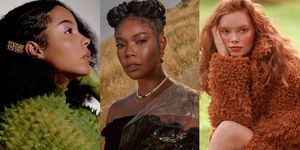
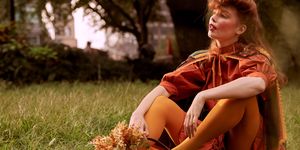
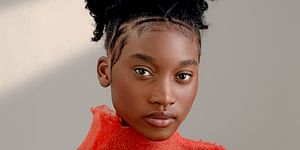
Lola Ogunnaike For more than a decade, Lola Ogunnaike has traveled the globe as a feature writer and television correspondent, covering key events in entertainment, popular culture and politics for the New York Times, CNN, NBC, MSNBC, BET, MTV and Al Jazeera. In that time, Lola has interviewed a wide array of notable figures, from First Lady Michelle Obama and Jane Fonda to George Clooney, Kanye West, Jennifer Lopez, Kevin Costner, Oprah Winfrey and Chinua Achebe. Lola currently moderates an interview series at the Wing, the world’s leading women-focused, co-working space collective and she’s an anchor at People TV, where she hosts breaking news specials, red carpet coverage and the popular series Couch Surfing, a weekly nostalgia trip that features actors sharing exclusive recollections from their storied careers. When she’s not “surfing,” Lola can be found discussing the intersection of pop culture and politics on MSNBC and CNN. Prior to leaping into the world of television, Lola worked as an Arts & Leisure reporter for the NewYork Times and prior to joining the New York Times Lola was a features reporter at the New York Daily News. Her articles have appeared in Rolling Stone Magazine, New York Magazine, Elle, Harper’s Bazaar, Food & Wine, In Style, USA Today, Essence and Vibe. Lola currently resides in Manhattan with her husband and toddler son.
